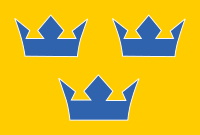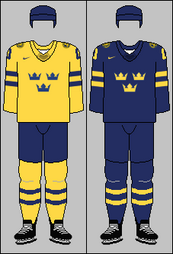 | |
| Nickname | Tre Kronor (Three Crowns) |
|---|---|
| Association | Swedish Ice Hockey Association |
| General manager | Josef Boumedienne Anders Lundberg |
| Head coach | Sam Hallam |
| Assistants | Stefan Klockare Nicklas Rahm Anders Sörensen |
| Captain | Rasmus Andersson |
| Most games | Jörgen Jönsson (285) [1] |
| Most points | Sven Tumba (186) [1] |
| Home stadium | Avicii Arena Stockholm, Sweden |
| Team colors | |
| IIHF code | SWE |
 | |
| Ranking | |
| Current IIHF | 4 |
| Highest IIHF | 1 (2006–07, 2013–14) |
| Lowest IIHF | 7 (2021, 2024) |
| First international | |
| Sweden (Antwerp, Belgium; 23 April 1920) [3] | |
| Biggest win | |
| Sweden (Prague, Czechoslovakia; 16 February 1947) [3] Sweden (St. Moritz, Switzerland; 7 February 1948) [4] | |
| Biggest defeat | |
| Canada (Chamonix, France; 29 January 1924) [3] | |
| Olympics | |
| Appearances | 23 (first in 1920 ) |
| Medals | |
| IIHF World Championships | |
| Appearances | 73 (first in 1920 ) |
| Best result | |
| World Cup / Canada Cup | |
| Appearances | 8 (first in 1976 ) |
| Best result | |
| European Championship | |
| Appearances | 12 |
| Best result | |
| International record (W–L–T) | |
| 1151–790–166 [5] | |

The Sweden men's national ice hockey team (Swedish : Sveriges herrlandslag i ishockey) is governed by the Swedish Ice Hockey Association. It is one of the most successful national ice hockey teams in the world and a member of the so-called "Big Six", the unofficial group of the six strongest men's ice hockey nations, along with Canada, the Czech Republic, Finland, Russia and the United States. [6]
Contents
- Tournament record
- Olympic Games
- Canada Cup
- World Cup
- European Championship
- World Championship
- Current roster
- All-time team record
- Awards
- Uniform evolution
- References
- External links
The team's nickname Tre Kronor, meaning "Three Crowns", refers to the emblem on the team jersey, which is found in the lesser national coat of arms of the Kingdom of Sweden. The first time this emblem was used on the national team's jersey was on 12 February 1938, during the World Championships in Prague. [7]
The team has won numerous medals at both the World Championships and the Winter Olympics. In 2006, they became the first team to win both tournaments in the same calendar year, by winning the 2006 Winter Olympics in a thrilling final against Finland by 3–2, and the 2006 World Championships by beating Czech Republic in the final, 4–0. [8] In 2013 the team was the first team to win the World Championships at home since the Soviet Union in 1986. In 2018, the Swedish team won its 11th, and most recent, title at the World Championships.









